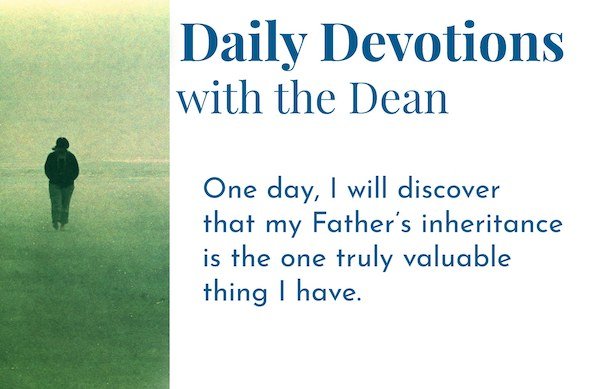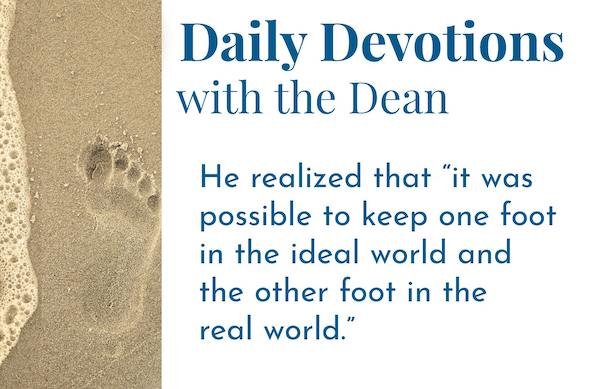Tuesday • 5/7/2024 •
Tuesday of the 6th Week of Easter
This morning’s Scriptures are: Psalm 78:1-39; Leviticus 26:1-20; 1 Timothy 2:1-6; Matthew 13:18-23
This morning’s Canticles are: Pascha Nostrum (“Christ Our Passover,” BCP, p. 83); following the OT reading, Canticle 13 (“A Song of Praise,” BCP, p. 90); following the Epistle reading, Canticle 18 (“A Song to the Lamb,” Revelation 4:11; 5:9-10, 13, BCP, p. 93)
Today’s passages from the Psalms, Leviticus, and Matthew are strong warnings about a failure of faith. They caution against allowing oneself to become impervious to God’s abundant grace.
Hard ground. In Jesus’s parable, hard ground simply makes the seed bounce off it. Psalm 78 sees in Israelites’ stubbornness in the wilderness an imperviousness to God’s grace. God rains down manna, “bread of angels … food enough.” But it wasn’t enough: “they did not stop their craving” (v. 29) … “they had no faith in his wonderful works” (v. 32). The goodness of God’s seed was falling on hard, dry, impenetrable ground.
Do not let that happen with me. Lord, have mercy.
Shallow ground shows hollow early promise. When the truths of God’s Word (even if I assent to them) don’t connect with the longings of my heart, those truths don’t get written to the “hard drive” of my being. They don’t connect with the core of my being. It’s like when I find myself in the garage and I can’t remember what I came there for (say, to get a nail so I could hang a picture). I start out with a purpose, but along the way I think about one thing and then another. By the time I get to the garage, the original intention is gone. It’s possible to experience an initial impulse to worship, obey, serve, even love. But the desire doesn’t last. It withers in the face of deeper, but lesser, impulses. It fades when faith doesn’t sustain it.
On the east bank of the Red Sea in the first blush of their exodus-rescue, the Israelites danced and sang the Song of Moses: “I will sing to the Lord, for he has triumphed gloriously” (Exodus 15:1). But the early joy faded: the wilderness journey was long and hard. Even “bread of angels” couldn’t satisfy the “cravings” (Psalm 78:24-30). “They had no faith in God, nor did they put their trust in his saving power” (Psalm 78:22). They forgot that Yahweh rescued them, and brought them where they were. They lost their confidence that Yahweh’s love would provide their needs on their way to their promised new home; and all he wanted was for them to love him in return.
“But I have this against you,” writes the angel to the church in Ephesus, “that you have left your first love” (Revelation 2:4). Never let me lose my first love. Christ, have mercy.
Image: Adaptation, Pixabay
Ground that will grow anything fails to distinguish between good and bad. Jesus’s point is that our hearts are fertile ground for all kinds of things—some good, some bad. Below the surface of every person are hidden motives and deep desires. I need to be discerning about what kind of “life” I allow my heart to cultivate. The Israelites of the Bible, for instance, are inclined to worship. That’s the wiring of their hearts. And that’s why Leviticus 26 leads with the command: “You shall make for yourselves no idols and erect no carved images or pillars … to worship at them. You shall keep my sabbaths and reverence my sanctuary” (Leviticus 26:2). Will they worship the true God his way? Or will they worship a god of their own fashioning? Or, just as bad, will they be so arrogant as to worship the true God—but in their own way?
Jesus forces probing questions with his words about thorns that choke: Do I believe that God is there, but when it comes to finding love, do I rely on lesser lovers? And when it comes to comfort, do I go to Jack Daniels or fill-in-the-blank? Do I believe that every person bears God’s image, but do I only care about the ones who can improve my lot? Do I believe I am to love my neighbor, but refuse to curb my freedom and wear a mask to protect their health? Do I believe Christ died for my sins, but justify my existence by being a people-pleaser? Do I believe my hope lies in Christ’s return, but find myself manic—or, alternatively, incapacitated—over how to protect my portfolio?
Let my heart be neither hard ground nor shallow ground nor indiscriminate ground. Let my heart be good ground for your Word. Lord, have mercy.
Collect for the Sixth Sunday of Easter. O God, you have prepared for those who love you such good things as surpass our understanding: Pour into our hearts such love towards you, that we, loving you in all things and above all things, may obtain your promises, which exceed all that we can desire; through Jesus Christ our Lord, who lives and reigns with you and the Holy Spirit, one God, for ever and ever. Amen.
Be blessed this day.
Reggie Kidd+













